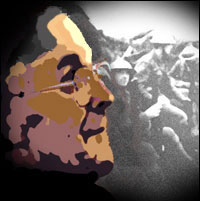Without Comment Or Complaint
Created | Updated Apr 20, 2006

The wartime story of S/115863 Staff Serjeant Edwin John Inge
Foreword by his daughter, Deborah Priebe
Like so many of his generation, Edwin (Ted) Inge was called up to fight in World War Two. An only child of a working-class family, he was born on 18th January 1919, in Folkestone Kent, barely two months after the Armistice at the end of the First World War was signed. From 1927 to 1935 he attended Folkestone's Harvey Grammar School, along with David Whitehead, who later achieved fame as one of the code-breakers at Bletchley Park.
But this account contains little of the heroics to be found in many of the well-known accounts of the events of the Second World War or the high drama of film and TV. Rather it is the story of a very ordinary man who, along with thousands of others, was called upon to do his bit. But it is no less a remarkable story for that, simply because this was the last time that people working in shops and offices would be willing to do what they were asked largely without comment or complaint and with a wry sense of humour and optimism for the future which many of them still
possess to this day. This is his story.
Part 1 - Peace in our time?
When I think about WWII, my mind really goes back to the year 1938, when war clouds were looming all over Europe, and to men of my generation (born around 1918/1920) it was only a matter of 'when will hostilities start'. The Government of the day were in no doubt that war was inevitable at some time and so we had the strange spectacle in the summer of 1938 (or was it 1939?) of trenches being dug in peace time in various places in Folkestone and I remember helping to dig them in Radnor Park and Bouverie Square, long before it was a Bus Station.
When Chamberlain returned from Munich late in 1938 after his meeting with Hitler, there was a phoney peace, but very few people were convinced that all was well. Not least the Government, who announced its conscription plans early in 1939, whereby all young men of 19 and 20 had to register for service in the armed forces. I well remember having to go to Canterbury Barracks (do they still exist?) for registration and a medical inspection, and then spending the subsequent months waiting for the call-up papers. Initially, the service was to be for two years, but this was suspended indefinitely when war was finally declared in September 1939. Some of the early conscripts had, of course, already served several months before that, and considered themselves unlucky to be among the earlier age groups.
Part 2 - There'll be a welcome in the hillsides!
As far as I was concerned, I was sent for (to finish the War!) on
16th October, 1939 and ordered to join the Army at Aldershot as a member of the Royal Army Service Corps. The early days were spen 'square-bashing', getting fit, learning how to shoot, and kill with the aid of a bayonet! I don't recall being allowed to come home during the training period, but Christmas was approaching, and I thought we might be allowed a short visit.
However, with the logic that I found was always going to be part of Army life (!), I was sent to Carmarthen, South Wales, on my own, just before Christmas to join a Welsh Division! Somebody must have discovered my maternal grandfather was Welsh! Most of my new colleagues were elderly Territorials, having seen service in WWI, and spoke Welsh in preference to English. I was welcomed with stories of the Somme, Mons, and other well-known WWI battles and felt completely lost. However, there was some compensation - I saw Vera Lynn at Tenby for the first of many times during the war - she was always first class.
It soon transpired that because I was known to have had clerical experience in peace time (I worked for Folkestone Council) I was to help form, and be part of, the administration staff of a Battle School, whose whereabouts were secret. Gradually, more and more of the staff arrived from far and wide, all from differing units and originating from one end of the country to the other – what a mixed bag it was.

Ted Inge on enlistment, Aldershot 1939. The photo is taken from his Army Pay book which contained a soldier's personal details and the well-known instruction to give only your name, rank and
number if captured. Other information such as the nationality of his parents, his place of birth and where he enlisted was deliberately obliterated before he went on active service in case it could be of use to the enemy.
The Without Comment Or Complaint Archive
